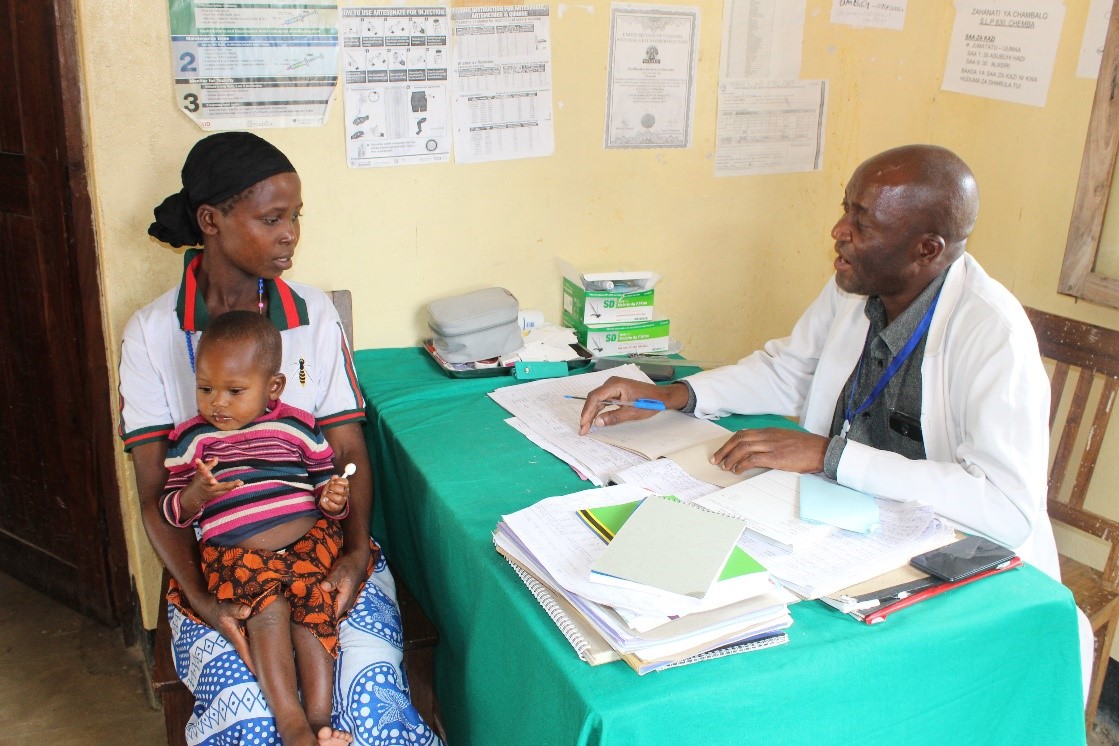Improving primary healthcare through the Health Basket Fund
News
20 November 2020
Clinical Officer at Chambalo Dispensary attending to a child.
Tanzania’s Health Basket Fund (HBF) is a pooled funding mechanism that contributes to government efforts to strengthen primary health care services. Ireland has contributed about 10% of the Health Basket Fund since its inception 21 years ago, and in the last 5 years, has contributed over €34.5 million, which was used to implement the Health Sector Strategic Plan IV.
Ninety percent of the Health Basket Funds go to 184 Local Government Authorities (LGAs) to support the delivery of primary health services in more than 5,533 primary health facilities. This includes local dispensaries, health centres and district hospitals. The remaining 10% goes to the regional secretariats; the central Ministry of Health, Community Development, Gender, Elderly and Children and the President’s Office for Regional Administration and Local Government for oversight, planning, quality improvement, monitoring and supervision.
Following the introduction of direct health facility financing in 2017/18, disbursements of funds now go directly to health facilities from the Ministry of Finance and Planning rather than through Local Government Authorities. This decentralised approach speeds up availability of funds to maintain supplies at the health facility level, and enhances community ownership of local services. This direct financing approach ensures that primary health facilities were in a better position to procure medicines and medical supplies and 93.2% of health facilities reported availability of medicines and medical supplies at the end of the financial year2019/2020.
Despite these achievements, challenges remain. These relate to late receipt of funds, shortages of skilled health staff and delays due to the distances between facilities and District Authorities who are required to oversee that expenditures are properly planned, accounted for, and reported.
To address this challenge, the HBF has supported the recruitment and payment of salaries for Accounts Assistants to support direct finance management in all health centres and dispensaries. These Accounts Assistants have now been mainstreamed into the government payroll system and have strengthened financial management, accounting, and reporting at the primary healthcare level.
The Government of Tanzania and health stakeholders are currently in the process of developing the Fifth Health Sector Strategic Plan, which will provide the framework for health interventions from 2020-2025. Ireland has contributed €5m towards activities in 2020/2021 under this plan, which is focused on three outcomes:
1. Achieve universal health coverage including access, coverage and quality.
2. Preparedness and proper response to epidemics, emergencies and disasters
3. Promote a healthier population by addressing the social determinants of health.
Over the past three years the HBF has supported government efforts to improve reproductive, maternal, new-born, and child health (RMNCH) through the provision of comprehensive emergency obstetrics and new-born care services. 304 Health Centres are at different stages of upgrading, and to date a total 189 have started to provide these services. Activities in 2020/2021 will seek to expand coverage to the remaining 115 health facilities, and address challenges for those that have already begun providing services.
Other HBF 2020/2021 priorities include the training of 620 anaesthetists in primary health facilities providing reproductive, maternal, new-born, child and adolescent health services.
The HBF receives funds from 8 donors - 5 bilateral (Switzerland, Denmark, Canada, Korea, and Ireland) and 3 multilateral (World Bank, UNICEF and UNFPA) and had a total budget US$55.2 million in 2019/2020. Following the outbreak of COVID-19, the HBF took the decision to allocate US$6.18 towards Local Government Authority responses at the primary healthcare level, including the procurement of Personal Protective Equipment (PPE) and improvements in Infection Prevention and Control in local health facilities.


